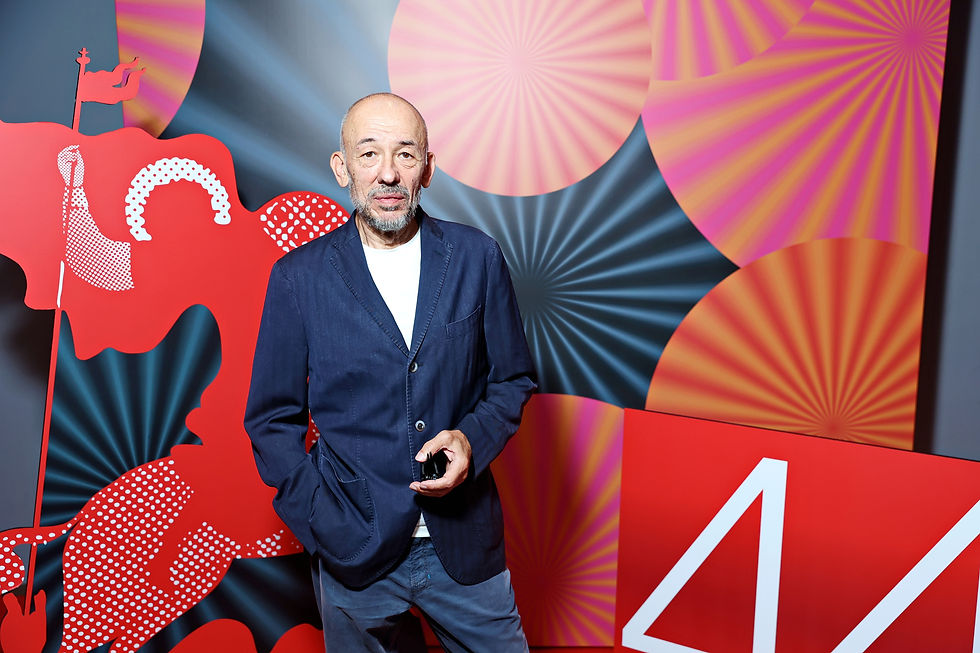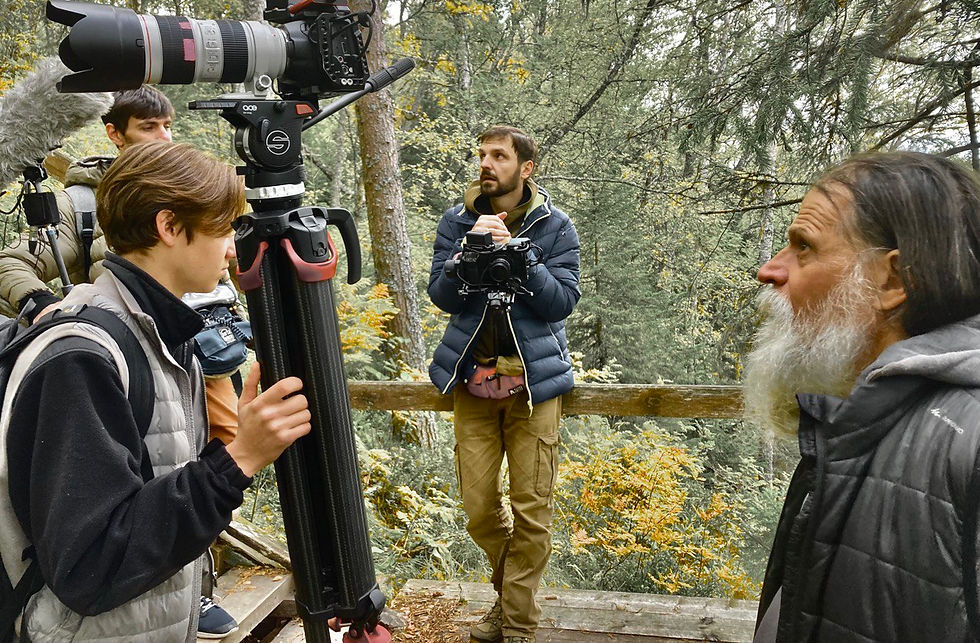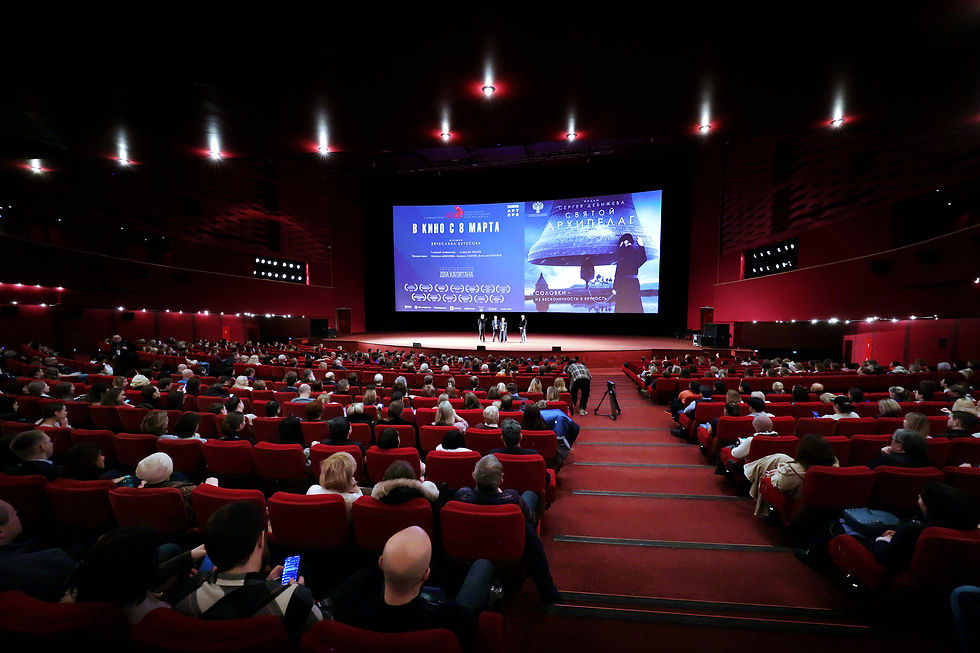Sergei Debizhev and his documentary The Holy Archipelago, from infinity to eternity.
- Federica Alice Carlino

- Apr 26, 2023
- 8 min read
Updated: Apr 28, 2023

The Holy Archipelago is a documentary from Russia, it educates us about the Solovetsky Monastery. The documentary searches for the true meanings of life, faith, hope, and love. The Archipelago is located on the far outskirts of Russia. However, by the will of fate, it has become one of the most powerful symbols of the Russian spirit.
The documentary was filmed on Solovki for 2 years. Step by step, the film crew went deep into the measured calm concentrated prayer life of the monastery. The audience will get an idea of the life and spiritual work of this place. The substantive part of the film is in-depth conversations with wise monks. Here we will find deep reflections and monologues on issues important in everyone's life. Understanding the importance of the topic, the monastery, represented by the abbot and the whole brotherhood, actively participated in the filming. The documentary included many unique shots, including the sacrament of tonsure. The content of the film is in harmony with the breathtaking cinematography. The way the camera captures the fantastic light and nature of Solovki islands is stunning. The film was shot in 6K format.

Sergei Debizhev is a film director from Russia. He lives in Saint Petersburg, but films worldwide. He comes from a profound art education. He has studied visual arts and the history of art for many years, it's his strong point. "The knowledge of harmony laws allows me to put life into films and make them more than just films…"
Award-winning filmmaker, screenwriter, and social influencer. He is a trailblazer in a film style that creates poetic images of extraordinary emotional impact together with profound meaning for audiences worldwide. Debizhev is prominent in the film world as one of the most authoritative documentarians of Russia. He has directed more than 30 feature films and nonfiction stories about important issues of our time. Many of them were awarded prizes and diplomas from prestigious international and Russian film festivals. His film, The Celestial Tavrida, was shortlisted for 27th Shanghai TV Festival Magnolia Awards as the Best foreign film and 11th China Academy Awards of Documentary Film for Best Editing.

When did you discover this was your career path?
S- The lightning of world knowledge struck me once.
To speak seriously, nowadays it is not just a vocation, it is a duty. People are to be saved! Modern cinematography has exploited their nervous system to the limit with all its thrillers, translated aggression, visual and sound effects, bloodshed abundant in details… What we do is a kind of therapy))) disengaging people from spiritual shock… I believe it is high time to work with big values. Cinematography should stop scarring and tickling people; it is time to talk about the profound purports of life, to turn to people's hearts and souls.
Which filmmakers or artists inspired you?
S- Botticelli, Michelangelo, Leonardo, Jan van Eyck, Velázquez… I got inspired by the very process of creating cinema as a piece of reality that no longer exists in reality… Certainly, I feel joy in such great masters as Godfrey Reggio, Tarkovsky, Fellini, Werner Herzog, Kurosawa… They gave meanings to cinematography

The look of your documentary is fascinating, how did you come up with the idea of shooting it in 6k?
S-High visual and sound resolution is just a regular rule of the game today. The film was made for a large screen and now it is shown at cinemas all over the country.
What inspired you to create The Holy Archipelago? What is your main goal with this project?
S- Spiritual life is more significant and interesting than the material part. The atheistic vision of the world collapsed long ago, so there is no need to clutch at it. Materialism failed to explain anything. “The Holy Archipelago” is the first large-scale film on a spiritually religious topic from Russia. We try to understand the difference between time and eternity, what the Holy history is, and what the main purport of humane existence is.

What's your connection with this reality?
S- Faith, Hope, and Charity [Love]. Intentionally simplifying life in an attempt to reduce it all to instincts and to deafen people with the noise information resulted in a surge of interest in traditional religious concepts. If a society is not bound by some religious tradition, it lacks a root system.
How did you and your team come up together? What started this collaboration?
S- We have been a steady crew working on several recent films. In comparison with a feature film crew, the crew of “The Holy Archipelago” is not big at all. However, from my point of view, it is essential that our crew is not only a bunch of professionals but also like-minded people who are keener on the values rather than simply on timetables. This time Vyatcheslav Butusov, a very famous Russian rock musician and composer, joined us too. This is his first experience of composing music for a film and, as for me, an incredibly successful one. Now Butusov is a much grander musician than we used to know. He is now into symphonic and spiritual music. For “The Holy Archipelago” he created music that put life into the picture and gave it a dimension and spiritual fullness. His part was important, the film became an alloy of music and picture.

What was the biggest challenge for you?
S-The greatest challenge is the very life. Life challenges us every day, and tests our patience. If you have managed a task, it gives you a more difficult one. And it goes like this all the way till the end.

We think producing this documentary wasn't easy, are there any aspects of it that you want to share with us?
S- While filming at some sacred sites, it is essential not to bring along all your intellect, snobbishness, professionalism, and pride. One should trust in the Divine Providence and then, possibly, something will come off it…
We heard that it took you two years to film this project, what was the process and why did it take that long?
S- Such projects cannot stand fuss and deadlines. In this film there are shown all seasons, complicated shots made on land, in the air, and under water; and then there comes editing, sound, color correction, and music, which all take time. Let alone the fact that the film was being shot during the pandemic which made customary routine even more complicated. On the other hand, it helped us too because we were able to film the monastery in its original look since the stream of tourists was stopped then.

What led you to this documentary path? What do documentaries mean to you and why it's your creative trademark?
S- Let us look at cinematograph as a phenomenon. Feature films today are just commercial entertainment – unfortunately, there is no spiritual breakthrough in evidence. Here comes the question: how much longer is it possible to jeer at the human psyche, constantly showing people all the nightmares of this world? The exploitation of the cult of evil, lust and blood, pathology and perversions of all sorts… all these undermine the human psyche, poison and disfigure the culture itself and art. In my opinion, that will do, it is already too much. True art has never appealed to the instincts, but to the soul of people, to their hearts, which is not the case today except for the best examples of documentaries. A big documentary is able to realize where we are, how history has developed into it, how it has come to this point, and what is to be ahead, in our future. A documentary is a very powerful tool that can affect the key issues of public life.

Your work is bringing you multiple awards all over the world and they are definitely deserved! Would you like to talk about your upcoming project? Your new documentary film, The Cross, which is scheduled to premiere in 2024? What can you anticipate?
S- Cross. This word stands for colossal sacred values which we try to disclose and convey. The cross is an ancient symbol that dates back for ages. Everyone carries their cross. There is a profound value in it. There is a reflection of life continuing in time and its relation to eternity. It is an international project with vast geography of shooting sites. Apart from Russia, we filmed in ancient Christian monasteries in Egypt, Israel, Georgia, Ethiopia… Hopefully it will help extend the geography of screening the film worldwide.

You come from Russia, how is the filmmaking environment in your country and what would you bring to it?
S- Russian cinematography adopted the Hollywood scheme which resulted in a substantial decrease in its quality, especially its semantic constituent. Now it is vital to get back to traditional Russian cinema, in which content, dramaturgic qualities, and visual aesthetics are relevant to the cultural code developed over time. The cinematographers of the elder generation certainly remember the prize winners of major European film festivals: “The Cranes Are Flying” by Mikhail Kalatozov, “War And Peace” by Serguey Bondarchuk, “The Ballad of a Soldier” by Grigory Chukhray, “Andrei Rublyov” by Andrei Tarkovsky and many others.

What would you say to someone that wants to start this path as you did?
S- Open your heart and remember that “to see and to observe are different things to do”.
What's your dream project?
S- I do not dream, I do. All my films can be put in one line. When this line is over, this will be my humble contribution… Every person has a mission; the main thing is to realize what it is.
Who would you suggest this documentary to, and why?
S- First of all, it is Russia, Orthodox, and all Christian countries. At a professional level, people who are interested in documentaries, follow their development and realize their important part in the modern, chaotic world.
What do you expect from the future? What do you hope it will bring you on a professional level?
S- Nowadays no one can forecast the future. We live inside history. The only thing we can do is to try hard and create this future. The documentary is here and it has immense significance as the last island of truth! Today is the most interesting time for those who are capable of creative analysis of life, who has sharp look and a sensitive ear. Now every one of us, literally, is responsible for the future of the whole world.

Your documentary won different awards with us, we truly enjoyed this work, how is it going with festivals so far?
S- “The Holy Archipelago” became the best film of the Documentary Competition at the 44th Moscow International film festival and got the award of “The Silver Saint George”. Moreover, for all the history of the main international film festival in Russia, Russian non-feature film has got the prize for the first time. At major Russian film festivals for the last year, this film has got a record number of awards. Russian Academy of film critics adjudged their main award to us. At all festival screenings, the house was full. And now “The Holy Archipelago” has started winning international awards. By now the film has already won 21 awards. The avalanche of interest in our film is quite surprising. All that is happening I call “the miracle of “The Holy Archipelago”. It is a pleasure to see that people yearn for serious cinema and profound values.
Thank you for your time, we wish you the best for your career and your future projects and we can't wait to see what's next for you!
S- Thank you very much for your cooperation and for the professionalism. It's a pleasure to work with your festival!
To contact Sergei's Team send an email to:
pr@2kapitana.ru
Watch the English trailer there:
THEIR COMPANY LINKS
If you also want to do an interview with us, send us your works on Film Freeway.








Comments